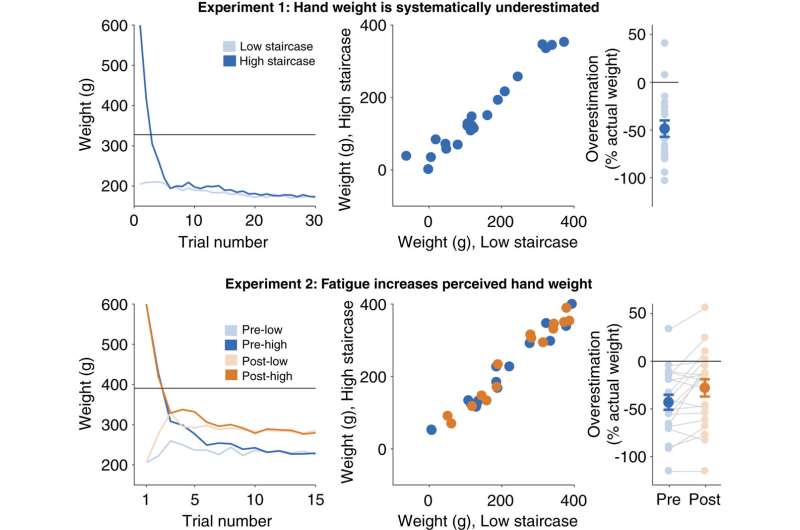July 25, 2023 report
This article has been reviewed according to Science X's editorial process and policies. Editors have highlighted the following attributes while ensuring the content's credibility:
fact-checked
peer-reviewed publication
trusted source
proofread
Experiments show people dramatically underestimate how much their hands weigh

A team of psychologists at the University of London, has found that people typically greatly underestimate how much their hands weigh. Their study has been published in Current Biology.
Prior research has shown that many people fitted with artificial limbs say they feel heavy—this, despite the fact that most such limbs are lighter than natural limbs. In this new effort, the research team sought to learn more about this phenomenon by testing people to see how much they thought their natural hands weighed.
The experiments involved asking 20 adult volunteers to sit in a chair with pillar-type armrests with fixed screens that prevented the volunteer from seeing their hands. Each was asked to allow their left hand to dangle off the edge of the rest. After a few moments, a weight was attached to the left wrist and the hand was left to dangle again. A researcher then asked the volunteer which was heavier, their hand, or the weight. This exercise was repeated multiple times with different amounts of weight.
The research team found that on average, the volunteers underestimated the weight of their hands by 49.4%. The human hand weighs on average 400 grams—thus, the volunteers thought they weighed just 200 on average. The researchers were not able to explain the disparity, but suggest it might have something to do with making movement feel less taxing.
The team repeated the experiment with different volunteers, but this time, each was first asked to flex a dynamometer for 10 minutes, making the hand feel fatigued. After testing for hand weight estimates, they found the volunteers underestimated their hand weight by just 29%—a finding that suggests a built-in response to fatigue, which encourages resting.
The findings could lead to changes in the design of prosthetics. If people could be convinced that their artificial limbs are real, the researchers theorize, they may cease feeling them as heavier.
More information: Elisa R. Ferrè et al, Systematic underestimation of human hand weight, Current Biology (2023). DOI: 10.1016/j.cub.2023.05.041
© 2023 Science X Network





















